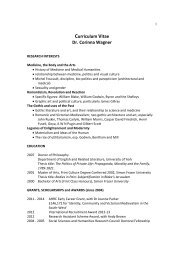'Cast out into the hellish night': Pagan Virtue and ... - Humanities
'Cast out into the hellish night': Pagan Virtue and ... - Humanities
'Cast out into the hellish night': Pagan Virtue and ... - Humanities
Create successful ePaper yourself
Turn your PDF publications into a flip-book with our unique Google optimized e-Paper software.
Philippa Byrne Ex Historia 49<br />
ultimately given <strong>the</strong> title De vero falsoque bono (On <strong>the</strong> True <strong>and</strong> False Good). 7 De voluptate is modelled<br />
on Cicero’s De finibus bonorum et malorum, a dialogue in which Cicero examines <strong>and</strong> compares <strong>the</strong><br />
classical ethical systems of <strong>the</strong> followers of Epicurus, <strong>the</strong> Stoics <strong>and</strong> <strong>the</strong> Academy. 8<br />
In De<br />
voluptate, Valla follows a similar scheme, comparing Stoic, Epicurean, <strong>and</strong> Christian moral<br />
philosophies. Three orators examine whe<strong>the</strong>r <strong>the</strong> true good for man lies in Stoic virtue, in an<br />
Epicurean love of corporeal pleasures or in <strong>the</strong> Christian vision of God. Valla gives <strong>the</strong>se parts<br />
to his contemporaries: <strong>the</strong> jurist Catone Sacco speaks for <strong>the</strong> Stoics, <strong>the</strong> poet Maffeo Vegio<br />
attacks Stoicism by espousing <strong>the</strong> teachings of Epicurus, <strong>and</strong> Antonio da Rho, a Franciscan friar,<br />
pronounces a Christian verdict upon <strong>the</strong>m both. 9<br />
Valla wrote ab<strong>out</strong> Epicureanism before <strong>the</strong> Renaissance rediscovery of classical Epicurean texts.<br />
Poggio Bracciolini had not yet circulated his newly-discovered manuscript of first century<br />
Epicurean philosopher Lucretius’ De rerum natura, <strong>and</strong> Valla wrote with<strong>out</strong> access to Diogenes<br />
Laertius’ Lives of <strong>the</strong> Philosophers, which discussed Epicurus’ teachings in greater detail. 10 Nor had<br />
Valla read one of <strong>the</strong> core texts of Stoic thought in <strong>the</strong> later Renaissance, as manuscripts<br />
containing <strong>the</strong> Enchiridion of Epictetus were fragmentary <strong>and</strong> scattered across Italy. 11<br />
Valla’s<br />
discussion of <strong>the</strong> ancient schools of philosophy, <strong>the</strong>refore, was not based on any new<br />
information, but on what could be gleaned from <strong>the</strong> writings of Cicero <strong>and</strong> Seneca.<br />
7 All quotations are taken from A. K. Hieatt’s translation of De voluptate (New York: Abaris Books, 1977),<br />
based on <strong>the</strong> revisions to <strong>the</strong> text Valla made in <strong>the</strong> final years of his life.<br />
8 On <strong>the</strong> circulation of De finibus see Texts <strong>and</strong> Transmission: A Survey of <strong>the</strong> Latin Classics, ed. by L. D.<br />
Reynolds (Oxford: Clarendon Press, 1983), pp. 112-15.<br />
9 For Vegio see Michael C. J. Putnam’s introduction to his Short Epics (London: Harvard University Press,<br />
2004); for da Rho, David Ru<strong>the</strong>rford, Early Renaissance Invective <strong>and</strong> <strong>the</strong> Controversies of Antonio da Rho<br />
(Tempe: Arizona Center for Medieval <strong>and</strong> Renaissance Texts <strong>and</strong> Studies, 2005), pp. 7-40.<br />
10 Lucretius’ De rerum natura, was rediscovered in 1417, but not copied <strong>and</strong> circulated before <strong>the</strong> 1430s<br />
(Reynolds, Texts <strong>and</strong> Transmission, p. 221). Greek manuscripts of Diogenes Laertius’s Lives were pieced<br />
toge<strong>the</strong>r by Ambrogio Traversari, working on his Latin translation, completed in 1431.<br />
11 Niccolò Perotti’s Version of <strong>the</strong> Enchiridion of Epictetus, trans. by Revilo Pendleton Oliver (Urbana:<br />
University of Illinois Press, 1954), pp. 20-9.









